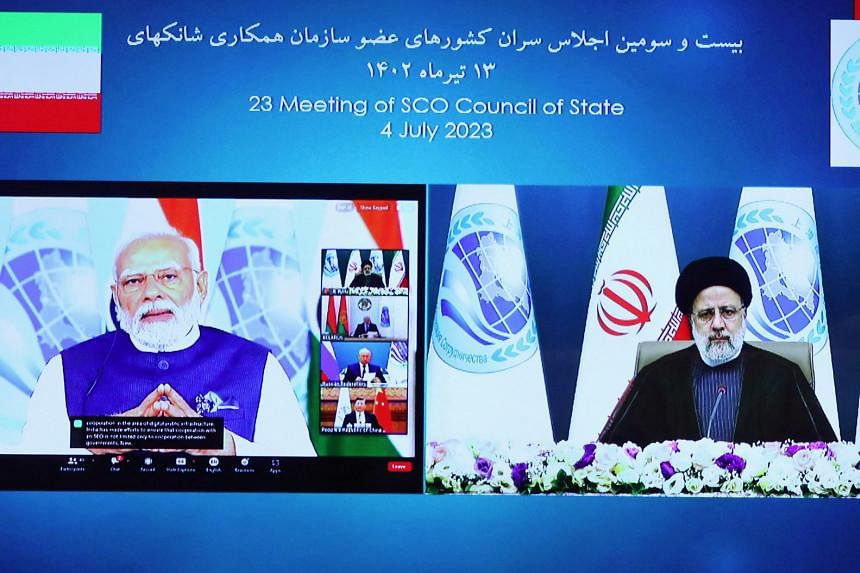NEW DELHI - India’s Prime Minister Narendra Modi welcomed Iran as a new member of the Shanghai Cooperation Organisation (SCO) at a leaders’ summit where Russian President Vladimir Putin said his country was “united as never before”, following an armed insurrection.
Mr Modi, fresh from a recent visit to the United States, was involved in a virtual summit with Mr Putin and Chinese President Xi Jinping along with the leaders of Pakistan, Kazakhstan, Kyrgyzstan, Tajikistan and Uzbekistan.
“I am happy that today, Iran is going to join the SCO family as a new member,” said Mr Modi, who also spoke on strengthening counter-terrorism efforts and pushing cooperation in areas such as emerging fuels.
Welcoming the start of the process to induct Belarus as a member by next year, Mr Modi, speaking from New Delhi, added: “The interest of other countries in joining SCO today is a testament to the importance of this organisation.”
Scheduling issues were partly why the meeting was forced to run virtually, diluting the anticipated pomp. Yet, it did not stop Mr Putin from delivering a message to the West in his first international appearance since an attempted insurrection in Russia last month.
There has been much speculation over Mr Putin’s grip on power after the Wagner group, a private mercenary outfit led by Yevgeny Prigozhin, took control of key military facilities in the Russian cities of Rostov-on-Don and Voronezh.
But after a last-minute deal reportedly brokered by Belarus, the Wagner fighters ended their march to Moscow and their leader, who has been critical of the Russian military, was exiled to Belarus.
“Russian political circles and the whole society clearly demonstrated their solidarity and high responsibility for the fate of the fatherland by speaking with one voice against the armed insurgency,” said Mr Putin, who thanked the SCO leaders, particularly Mr Modi, for their support.
Since the start of the war in Ukraine, the SCO countries have steered clear of censuring Russia.
In his remarks, Mr Xi said that “the SCO member-states must oppose unilateral economic sanctions”, believed to be a reference to Western sanctions against Russia.
The SCO was set up by China, Russia and Central Asian states as a security grouping to fight terrorism and offer an alternative to Western-dominated blocs. India became a full member in 2017 along with rival Pakistan.
Combined, the countries in the grouping account for 40 per cent of the world’s population and around 20 per cent of its GDP, primarily because of the presence of China and India.
India joined the SCO to get better access to Central Asia’s energy reserves to power its growing economy. But questions are being raised domestically about the benefits of being part of a grouping that contains China and Pakistan. There is increasing distrust between India and China because of longstanding border conflicts.
Mr Modi, in his opening statement, said that “some countries use cross-border terrorism as an instrument of their policies, provide shelter to terrorists. SCO should not hesitate to criticise such nations”. He did not mention Pakistan.
At the foreign ministers’ meeting in May in Goa, the SCO summit was overshadowed by a spat between India and Pakistan. India’s Foreign Minister S. Jaishankar called Pakistan “a promoter, justifier and spokesperson of a terrorism industry”.
At the same time, Mr Modi highlighted how “respect for sovereignty and territorial integrity” remained India’s vision for the SCO, in what was seen as a reference to the border troubles with China.
Analysts said that these are issues that hold India back within the SCO. Some believe the grouping offers an extra channel of communication with China. Others believe the issues have limited the engagement.
“India’s difficult ties with China and Pakistan in particular are weighing down on India’s involvement in the SCO. And the larger issue for India in balancing the West and Russia continues to be an important factor in this summit as well as going forward,” said Professor Harsh V. Pant, who is vice-president of studies and foreign policy at the Observer Research Foundation in New Delhi.
“While India would like to engage with the SCO, particularly Central Asia, the challenges and contradictions inherent in the SCO are coming to the fore with what is happening geopolitically in the world. And that will circumscribe India’s engagement with the SCO going forward.”
For India, Russia remains an important energy and defence partner with 60 per cent of Indian weaponry of Russian origin. As a result, India has refused to directly condemn Russia and has abstained from several votes at the United Nations against Moscow, a position the US has had to come to terms with.
This year, India has been under the spotlight on the global stage, with the presidency of the SCO and the G-20, where Mr Modi will host Mr Xi, Mr Putin and US President Joe Biden during the leaders’ meeting in September.


